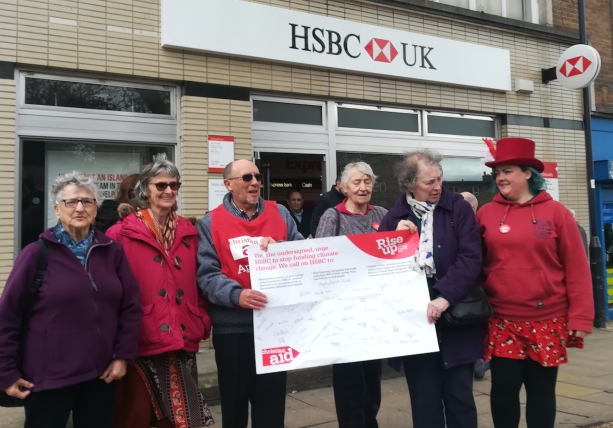Climate campaigners urge Shipley’s HSBC bank to stop investing in fossil fuels
Campaigners from churches and organisations in Bingley, Shipley and Bradford visited Shipley’s HSBC branch on Thursday March 21 to urge the bank to stop financing climate-wrecking fossil fuels

The campaigners were part of a national action by Christian Aid to visit branches across the country, calling on the global bank to ensure its activity is in keeping with the Paris Agreement’s target of keeping the global warming rise within 1.5 degrees above pre-industrial temperatures.
The campaigners delivered a letter to the branch staff to forward to HSBC CEO, John Flint, and a petition urging the bank to invest in clean energy and help protect the world and its people.
They also called on the bank to phase out financing fossil fuels altogether, and to remove Bangladesh, Vietnam and Indonesia from an exception to a bar on financing new coal-powered plants across the world.
Local Baptist minister, the Revd Dr Keith G Jones, who is Christian Aid coordinator for Shipley, said, 'These are exceptional times. We’ve sat back and expected other people to tackle climate change for too long.
‘Christian Aid’s Lent and Easter appeal is called Rise Up, and as the waters rise around the world we have to rise up, and speak for all those people whose livelihoods are being destroyed by climate change.
‘Leading scientists and the Intergovernmental Panel on Climate Change tell us we have 12 years to stop catastrophic climate change. We must do everything we can to make sure that those financing dirty fossil fuels are held to account.
‘HSBC has agreed to invest $100 billion in tackling climate change by 2025. This is fantastic. But it’s still investing in fossil fuels, which are fuelling climate change and destroying lives. We want HSBC to use its position as a major bank to lead the way, and close the gap between its rhetoric and its actions.’
Christian Aid works in 37 countries, and its partner organisations across the globe are already experiencing the devastating effects of climate change, which hits the poorest communities first and worst.
Baptist Times, 25/03/2019